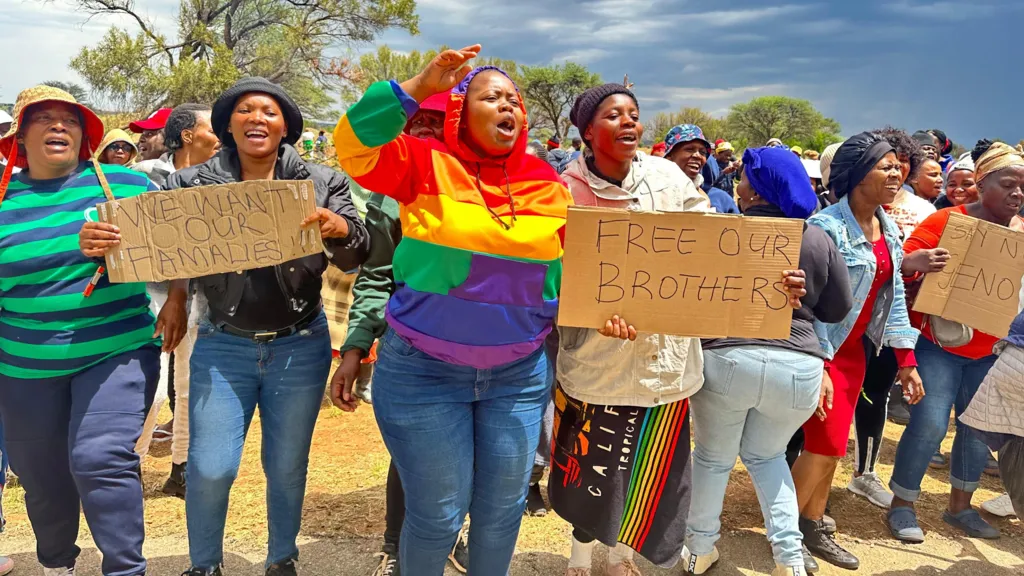Volunteers enter South Africa shaft to aid miners
4 min read
Local residents have pleaded with the authorities to assist the miners, but they have refused.

Local residents have pleaded with the authorities to assist the miners, but they have refused.
Dozens of volunteers have entered an abandoned gold mine in South Africa to assist what could be thousands of illegal miners trapped underground. The miners, believed to have been inside the shaft in Stilfontein for over a month, are struggling to survive in dire conditions. They entered the mine deliberately, hoping to extract gold or mineral residues, but have found themselves trapped without food or water, as authorities block outside aid.
Earlier in the week, a South African government minister declared, “We are going to smoke them out,” referring to the miners. The government has refused to provide aid, taking a tough stance against these illegal miners, known locally as “zama zama,” or “those who take a chance.” Many of these miners are undocumented migrants who fear arrest or deportation if they surface. Reports suggest some miners have resorted to eating vinegar and toothpaste to survive.
The underground conditions are worsening, and it is feared the miners are too weak to leave the mine unaided. The volunteers, organized into groups of 50, have been working tirelessly to help. It reportedly takes about an hour to pull a single miner out of the shaft. Lebogang Maiyane, one of the volunteers, condemned the government’s response, stating, “The government doesn’t care about the impact on the right to life of the illegal miners who remain beneath the surface – this is tantamount to murder.”
Illegal mining is a major issue in South Africa, where abandoned mines are frequently used by zama zama miners to extract precious metals, often at great personal risk. The practice costs the South African government hundreds of millions of dollars each year in lost revenues and has become a major contributor to the country’s illegal economy.
Authorities are hesitant to enter the mines due to concerns about safety. Some of the miners are armed, and others may be linked to criminal syndicates that recruit individuals for illegal mining operations. Busi Thabane, from the Benchmarks Foundation, which monitors corporate activities in South Africa, explained that many miners operate in these dangerous conditions to escape extreme poverty.
Many mines in South Africa have closed over the years, leaving workers without jobs. Desperate to survive, many miners, along with undocumented migrants, resort to digging for gold in abandoned shafts, selling their findings on the black market. There is even a small economy that supports the miners, with local vendors selling food, cigarettes, and even cooked meals to those working underground.
Despite the challenges, the government has refused to alter its stance. Minister Khumbudzo Ntshavheni declared, “We are not sending help to criminals. Criminals are not to be helped – they are to be persecuted.” Her harsh words were met with protests from the families of miners still trapped underground. One father, whose two sons are among those trapped, called the minister’s remarks “horrible,” insisting that “these people are human beings. They have families.”
Local residents have rallied around the miners, holding placards that read “Smoke ANC out” and “Down with Minister in Presidency” in protests near the mine. Police Minister Senzo Mchunu visited the site on Friday, but when he attempted to speak with the community, he was chased away by angry residents. Thandeka Tom, whose brother is trapped in the mine, criticized the government’s refusal to assist, pointing out that “there’s a problem of unemployment in the country and people are breaking the law as they try to put food on the table.”
As the standoff continues, the situation underground is becoming increasingly grim. Community leader Thembile Botman shared that volunteers recently pulled a body out of the mine, the stench of decomposition leaving them traumatized. It is not yet clear how the miner died, but the authorities have temporarily allowed local residents to send supplies down the shaft by rope to help the survivors.
While some miners have been rescued and sent to medical care, others have been taken into police custody. As part of the operation “Vala Umgodi” (Close the Hole), authorities have blocked all entrances and exits to the mine in an attempt to force the miners to surrender. In the past week, over 1,000 miners have emerged from the mine and been arrested.
However, the police operation is not without criticism. Thabane, the human rights advocate, said that the situation has become a “humanitarian crisis,” pointing out that many of the miners are simply trying to survive. She added that the government’s refusal to provide food or water to those underground could be a violation of their basic human rights.
The South African Human Rights Commission has launched an investigation into the government’s actions, raising concerns about the potential impact on the miners’ right to life. In recent months, illegal mining has become a lucrative but dangerous business across South Africa, with authorities confiscating high-caliber firearms, bullets, diamonds, and money from illegal miners. This is part of a broader effort to crack down on the practice, which is not only harmful to the miners but also has severe environmental consequences.
As the standoff continues, the plight of the zama zama miners serves as a stark reminder of the economic desperation faced by many South Africans and the dangerous lengths to which people will go in order to survive in a country grappling with widespread poverty and unemployment. The challenge for the government will be to balance the need for law and order with a compassionate response to a humanitarian crisis that continues to unfold beneath the surface.